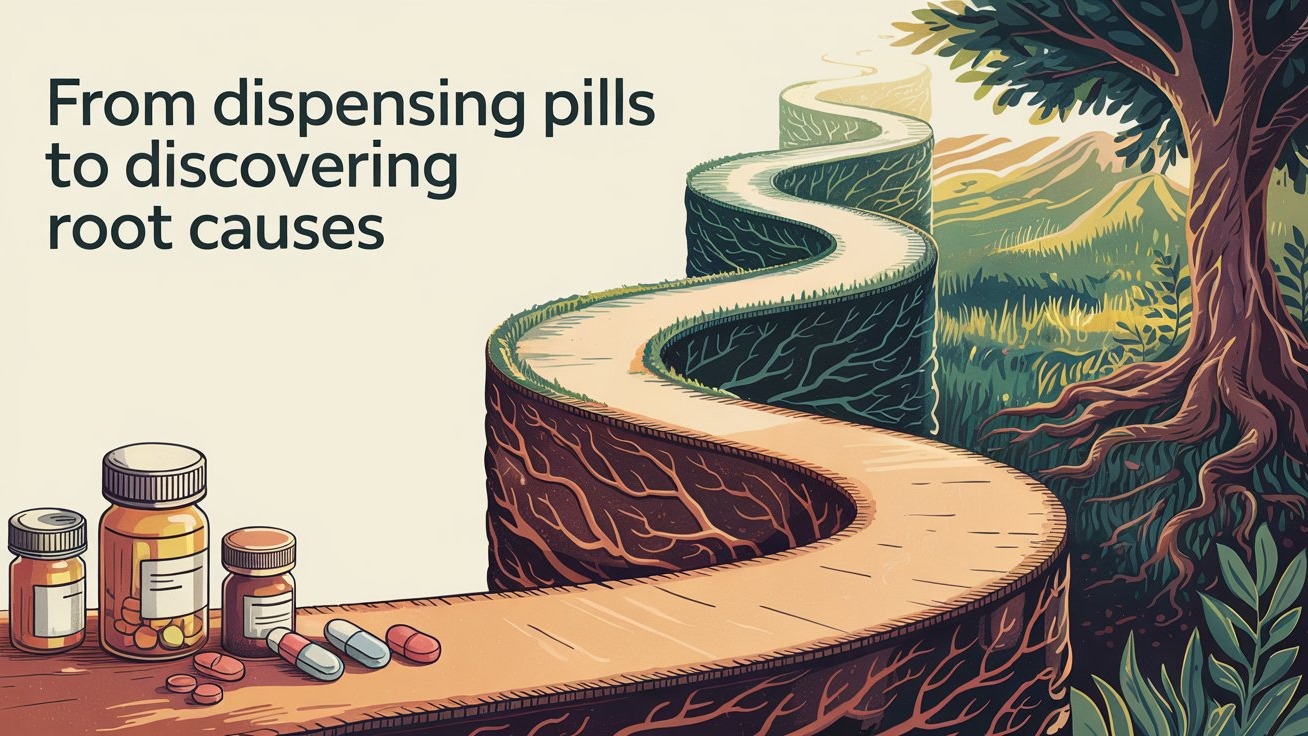
A Pharmacist's Unexpected Path to Healing
Have you ever wondered if your body's whispers—those subtle aches, persistent fatigue, or inexplicable brain fog—are actually messages urging you toward deeper healing?
Dr. Judy Magalhaes's story might forever change how you think about your health. After 35 years as a traditional pharmacist, Dr. Judy's life took a dramatic turn when COVID-19 left her battling debilitating neurological symptoms that conventional medicine couldn't resolve.
"I found myself in the same position as so many patients I'd served over the years," Dr. Judy shares. "I was doing everything 'right' according to my training—yet instead of healing, I was watching my health deteriorate before my eyes."
What happened next wasn't just a recovery; it was a complete reinvention. When traditional approaches failed her, Dr. Judy's pharmacist's curiosity led her to functional medicine and holistic healing practices. This transformation inspired her to establish HOPE—Holistic Options and Personal Empowerment—where she now guides others through their own healing journeys.
When Professional Becomes Personal
Dr. Judy's pharmacy career gave her a front-row seat to how conventional medicine operates. "Despite incredible advancements in pharmaceutical options, more people were taking more medications year after year, yet chronic illness rates continued climbing. Something fundamental wasn't adding up."
COVID-19 transformed Dr. Magalhaes from a healthcare provider to a patient. "The brain fog was so severe I couldn't remember basic information. My hands trembled. I experienced debilitating fatigue that no amount of rest seemed to touch," she recalls. "Each specialist offered another medication to manage symptoms, but no one was investigating why my body was struggling so profoundly."
One neurologist told her, "This might be your new normal. Some patients just don't fully recover." Dr. Magalhaes rejected this completely. "I couldn't accept that my body couldn't heal if given the right support."
The Turning Point
The breakthrough came when Dr. Magalhaes connected with a functional medicine practitioner who approached her case differently—ordering comprehensive testing that examined inflammatory markers, gut health parameters, nutrient status, and detoxification pathways.
"For the first time, someone was investigating why my body was struggling rather than just trying to suppress symptoms," she explains. "The test results revealed significant gut dysbiosis, several key nutrient deficiencies, and markers showing my body was in a state of chronic inflammation and oxidative stress."
With this new information, Dr. Judy began a personalized healing protocol addressing the root causes of her symptoms. "Within weeks, I started noticing improvements. It wasn't an overnight miracle, but it was measurable, sustainable progress that conventional approaches hadn't delivered."
The Power of Root-Cause Medicine
As Dr. Magalhaes's health improved, her professional focus shifted dramatically. "The most profound lesson was realizing how rarely we ask 'why' in conventional medicine," she explains. "When someone has high blood pressure, we prescribe an antihypertensive. But we rarely investigate what's causing these symptoms in the first place."
This insight led Dr. Magalhaes to pursue extensive training in functional medicine. "Functional lab testing was revolutionary for me," she says. "These tests paint a complete picture of what's happening at the cellular level."
Perhaps most surprising was her discovery about the gut microbiome's central role in overall health. "The research shows that gut health influences everything—brain function, immune response, hormone balance, even cardiovascular health. Many chronic issues that seem unrelated to digestion actually originate from gut dysfunction."
HOPE: A Different Kind of Healthcare Experience
When Dr. Magalhaes launched HOPE—Holistic Options for Personal Empowerment—she designed the practice to embody everything she wished she'd discovered during her own health journey.
"What sets us apart is our genuine partnership with clients," explains Dr. Magalhaes. "At HOPE, we dedicate hours to each person, carefully listening to their complete health narrative from beginning to end."
This personalized philosophy extends throughout the treatment process. After thorough testing identifies specific imbalances, Dr. Magalhaes develops custom protocols that address the root causes behind symptoms, not just the symptoms themselves.
"Education forms the foundation of our approach," she emphasizes. "I'm passionate about ensuring clients understand exactly why we recommend particular interventions.

Actionable Insights for Everyone
Dr. Magalhaes offers practical advice for anyone struggling with chronic symptoms:
1. Test, don't guess: "Standard blood work often misses critical information. Functional lab testing can reveal imbalances that standard testing doesn't capture."
2. Question the 'normal' narrative: "Never accept that chronic symptoms are simply your 'new normal' or an inevitable consequence of aging. These aren't just annoyances to manage; they're your body communicating that something needs attention."
3. Focus on your microbiome: "The health of your gut directly impacts your entire body. Simple dietary changes can dramatically improve not just digestive symptoms but energy, mood, skin health, and immune function."
4. Understand the inflammation connection: "Chronic inflammation underlies most modern diseases. Identifying your personal inflammation triggers can transform your health trajectory."
5. Recognize the powerful medicine of lifestyle: "Sleep quality, stress management, movement patterns, and environmental exposures are as important as what you eat."
A New Path to Healing
"You are your own biggest advocate," Dr. Magalhaes states emphatically. "No one knows your body better than you do. If something feels wrong, keep searching for answers."
Her journey represents more than a career pivot—it embodies a growing recognition that truly effective healthcare must address root causes, not just manage symptoms. "My greatest hope is that more people discover they don't have to accept chronic illness as inevitable. When we ask why and support the body's innate healing capacity, remarkable recovery becomes possible."
For those feeling stuck in a cycle of symptoms and medications without improvement, Dr. Judy's story offers something powerful: hope that another approach exists.
"Ask why, seek the root cause," she concludes, "because you can heal—often more completely than you've been led to believe."
Learn more about Dr. Judy Magalhaes's approach or HOPE, visit https://www.drjudym.com or follow her on https://www.linkedin.com/in/drjudym/ for regular insights on functional medicine and holistic health.

Dr. Judy Magalhaes is a highly experienced health practitioner, Board-Certified Geriatric Pharmacist, Lifestyle Wellness Coach, and Diabetes Care & Education Specialist. She is the founder of Holistic Options & Personal Empowerment (HOPE, LLC), where she is dedicated to empowering individuals to reclaim their health and wellness.
 Add Row
Add Row  Add
Add 




Write A Comment